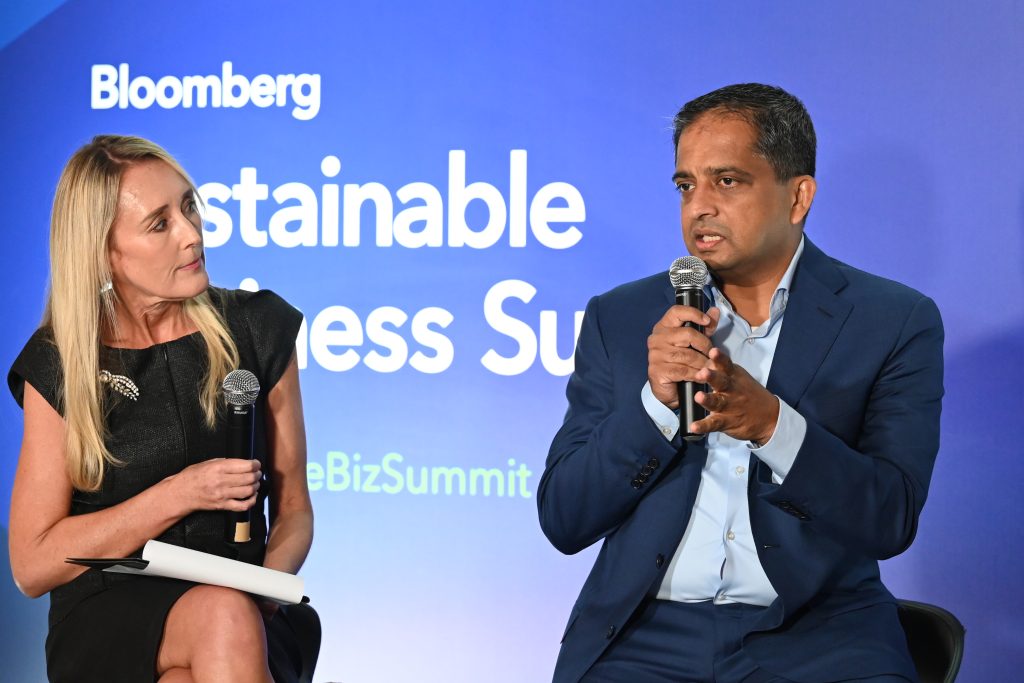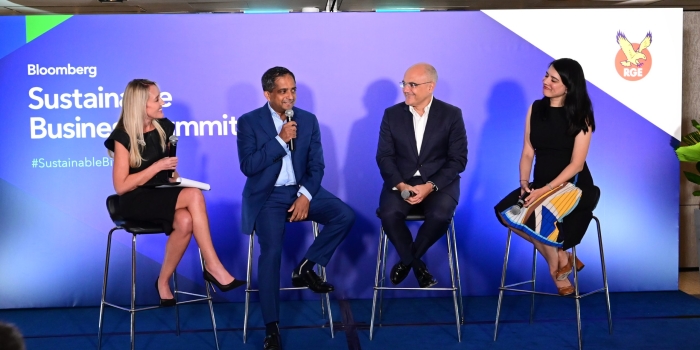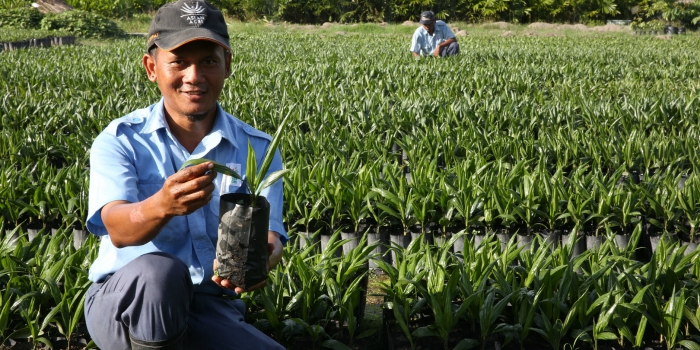At the closing dinner session of the 2023 Bloomberg Sustainable Business Summit, Pratheepan Karunagaran, Executive Director at Apical; Carlos Barrasa, Executive Vice President, Commercial and Clean Energies, Cepsa; and Munal Rathore, Partner, BCG explored the topic of “Sustainable Aviation: From Ambition to Action”. The discussion was moderated by Katrina Nicholas, Deputy Managing Editor, Global Business and Asia Transport Team Leader at Bloomberg.
Viable solutions to decarbonise air travel
Pratheepan began the session by sharing with the audience of more than 60 partners, investors, and industry players, the urgent need for the aviation industry to scale up its ability to decarbonise as demand for air travel increases globally.
He shared that aviation currently accounts for 2% to 3% of global carbon emissions and this is expected to grow with a projected 500 million tonnes of jet fuel required by 2030. The pressing challenge for the industry is to find sustainable solutions that can meet their energy needs without further exacerbating the environmental impact.
Carlos shared that based on Cepsa’s analysis, none of the alternative technologies such as electrification and hydrogen will be available before 2035. On the other hand, Sustainable Aviation Fuel or SAF can be a more immediate and viable low-carbon solution.
Adding to Carlos’ point, Pratheepan explained that SAF is a drop-in fuel which is compatible with existing aircraft and can be deployed as an alternative to jet fuel without the need for modifications to engines. Most importantly, SAF can cut carbon emissions by up to 90% compared to traditional jet fuel. He also shared that the current Hydro-processed Esters and Fatty Acids (HEFA) technology which uses liquid-based waste and residue to convert to SAF, will be able to supply the SAF that the world needs until 2030.
For the longer term beyond 2030, Pratheepan added that new technologies will have to come into play.
The panellists agreed that SAF can potentially help the aviation industry decarbonise at a scale that will allow it to reach its targets by 2030.

The cost of SAF
Despite SAF being an available solution to decarbonise the aviation sector, the current adoption rate of SAF is less than 1%. This is a result of two main challenges – cost and the availability of feedstock for the production of SAF.
Pratheepan did a live poll with the audience: “How many of you are willing to pay $7 more for a long-haul flight to London? And if you’re traveling on business class, how many of you are willing to pay $80 extra?” Majority of the audience raised their hands to express their willingness to pay a slight premium for more sustainable travel.
With consumers ready to embrace greener skies and pay a premium, Carlos emphasised: “The HEFA technology is mature and ready to go. What we need to do is to scale up the use of HEFA for SAF.”
Availability of feedstock
The other challenge is the availability of a constant supply of liquid-based feedstock for the production of SAF. This was when the conversation shifted to Singapore which can be a key driver in the SAF uptake. Pratheepan highlighted Singapore’s strategic advantages, owing to its geographical location and proximity to major palm oil producers in Malaysia and Indonesia. “Singapore has a definite natural advantage there. As an international hub for both business and aviation, and having access to large quantities of readily available feedstock from agricultural waste and residue, it can take a leading role in driving the adoption of SAF, in the region and beyond,” he said.
The private sector can also play a key role. Carlos shared that Cepsa and Apical recently entered into a joint venture to construct the largest second-generation biofuels plant in Southern Europe with a capacity of 500kMT. When this is completed, Apical will supply agricultural waste and residue as feedstock for the production of SAF and potentially reduce 1.5 million tons of CO2 per year.

Pratheepan highlighted Apical’s role as an integrated player with established supply chains from upstream to downstream. “As one of the largest vegetable oil processors in the world, we are able to efficiently extract waste and residue in large quantities from our global supply chain in a transparent, traceable manner for the sustained production of SAF,” he said.
Increasing awareness and collaboration
Pratheepan noted a growing awareness of sustainability among customers, despite initial hesitancy by passengers to bear additional costs for SAF. He highlighted the significance of early adopters and private corporations willing to pay a premium for decarbonised flights, indicating positive trends for the future. “Customers are increasingly conscious of the environmental impact, and that’s a positive sign. It shows that we are moving in the right direction,” he said. However, he emphasised the critical need for clear mandates and consistent policy frameworks from governments and the industry. Such measures will not only encourage more airlines to embrace SAF but also help overcome logistical and infrastructural challenges associated with transitioning to greener alternatives.
Carlos shared learnings from a European perspective, citing the example of Spain. For SAF to take off, he said: “It is not only the hardware, the infrastructure. It is also the software, the people and the skills that we need to build.”
Munal highlighted the collaborative nature of progress in the sustainable aviation fuel industry, describing it as a “team sport”. She emphasised that governments, airlines, and corporations must work together to create a strong demand signal, make SAF more affordable, and provide consistent policy frameworks to drive adoption.
Advocating for a greener future
The panellists’ discussion on SAF highlighted the importance of collective efforts in addressing capacity constraints, exploring new technologies, and making aviation more sustainable. “We have to work together and make an attempt to solve it,” Pratheepan said.
With a sense of urgency, great determination and by working together with governments, industry bodies, airlines and other players, greener skies can be achieved sooner, more cost effectively, and in a sustainable manner.








